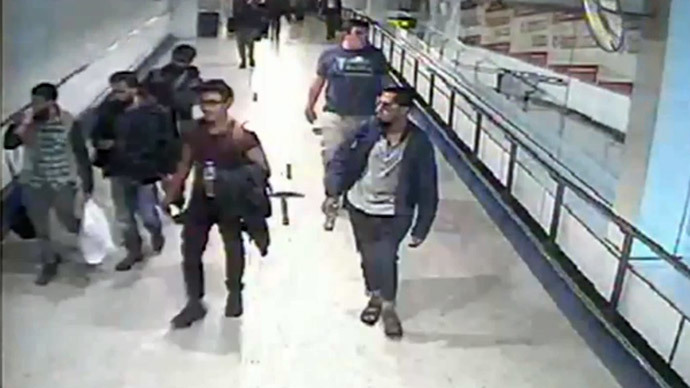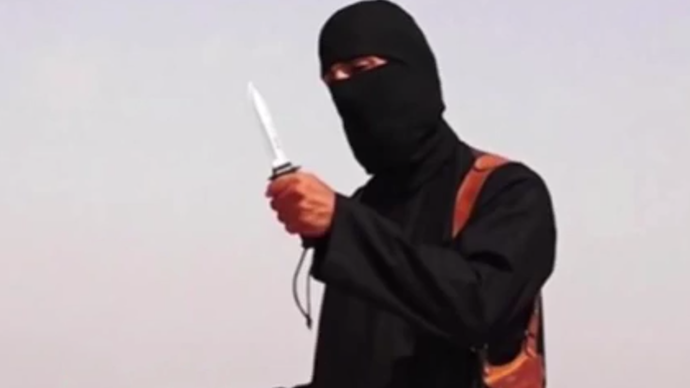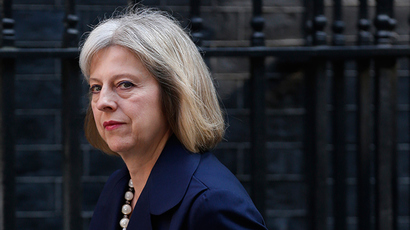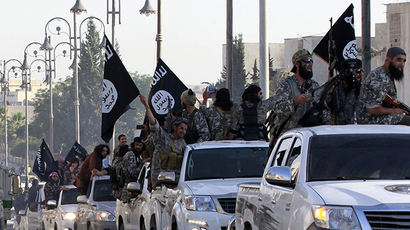'Bad Boys' jihadist cell could be key to identifying UK militant who killed Foley

Five men who left Britain in October last year have been shown on CCTV footage leaving the UK to join the Islamic State under the guise of taking a vacation in Turkey. One of the men could now be the key to identifying James Foley’s murderer.
CCTV footage shows the ‘Britani Brigade Bangladeshi Bad Boys’ making their way through Gatwick Airport en route to join the militant group Islamic State (IS), formerly known as ISIS or ISIL.
The five men from Portsmouth bought tickets on low-budget carrier Thomas Cook to the Turkish resort of Antalya in October, the Daily Mail reported.
The group’s members have been identified by British authorities as Muhammad Hamidur Rahman, 25, Mashudur Choudhury, 31, Assad Uzzaman, 25, Mehdi Hassan, 19, and Mamunur Roshid.
Now, 10 months later, Rahman, who worked as a shop assistant at UK clothing chain Primark until being sacked in September 2013, a month before leaving to take part in the jihadist movement, was reportedly killed in a gun battle in Syria last month.
Choudhury is in prison, convicted of travelling to Syria to receive terrorist training, the Telegraph reported. He will be sentenced on September 19.
Choudhury, who once ran a Muslim youth group, has been accused of being the ringleader and blamed for recruiting his friends. Others suggest he was simply a willing volunteer; a married father of two, with children aged five and two, who was desperate for a change of scene, the paper reports.
Choudhury was allegedly aided by Ifthekar Jaman, 23, the first of the Portsmouth jihadists to go to Syria. Jaman was killed in December while reportedly taking part in an assault on a major arms depot in eastern Syria.
Jihadist dropout
British security services are keen to re-interview Mashudur Choudhury, as he may have been in contact with the suspected killer of James Foley, a US journalist whose videotaped beheading last week prompted a manhunt by UK authorities.

One security expert said on Saturday: “MI5 will be hoping that prison has had a sobering effect on Choudhury. As a British jihadist, he may well have rubbed shoulders with the gang behind James Foley’s murder.”
When the five British would-be jihadists arrived in Turkey, an intermediary took them over the Syrian border. In Syria, instead of embarking in a violent armed struggle, Choudhury was made to do mundane chores, such as cooking, washing and looking after children in a makeshift nursery.
Authorities believe that Choudhury failed the IS training selection process and was sent home only three weeks after arriving. Upon his return, he was arrested after a tip-off about his activities from someone in the local community and he is now awaiting sentencing.
Around 30 UK citizens every month are now travelling to Syria and Iraq across the frontier, in a journey dubbed the “Jihad Express.” About 500 British citizens are believed to have travelled to Syria to join militant groups, though some have estimated that figure could be up to three times higher.
The issue of preventing extremism in the UK and how to stop British citizens travelling to Syria to join extremist militant groups has generated a great deal of controversy. As UK Special Forces seek the British-born Islamic State jihadist suspected of murdering Foley, the government is redoubling efforts to stop Brits from going to Syria and to prosecute those who return.
UK's anti-terror scheme a ‘failure’
Meanwhile, a senior figure in the Muslim Council of Britain said the government’s anti-terrorism strategy has "failed." Deputy Secretary General Harun Khan told BBC Radio 5 live the Prevent scheme was having a "negative impact” and in fact alienated young Muslims and pushed them towards radical groups.
Prevent, which is part of the government's broader counter-terrorism strategy, aims to "stop people becoming terrorists or supporting terrorism,” by mentoring people that are at the risk of “being drawn into terrorist activity.”
Khan said some people were "lost and disenfranchised" and vulnerable to radicalization as they felt they could not express their views.
A former senior Muslim UK Army officer reiterated this view. British society, its political class and community leaders must share the blame for the "jihad generation" of young Britons joining the Islamic State, Afzal Amin said on Sunday.
In an interview with The Independent he argued that young Muslims in Britain have been left disenfranchised by politics and let down by imams and other community leaders.
"That so many of them feel so disenfranchised with us and then turn to this gang of brigands cloaked with a false version of Islam is not their fault. It is our fault: we who are the society in which they were born, went to school, were raised and became young, independently minded adults. We have failed them, and any successful prognosis must be based on an accurate diagnosis,” Amin said.

Home Secretary Theresa May proposed changes to the law to target extremists and radicalization in the UK last week. She said she was "looking again at the case for new banning orders for extremist groups." She has also publicly reiterated her office’s ability to strip Brits fighting abroad of their citizenship.
The UK currently has no consistent policy on who can and can’t travel abroad to fight. London Mayor Boris Johnson on Monday suggested a law that would assume anyone visiting a war zone without first notifying authorities is doing so for terrorist purposes. Boris Johnson also became the latest politician to demand that suspected IS militants returning to the UK are stripped of their citizenship.
On Tuesday, Downing Street rejected Johnson’s plan as a “kneejerk” response.
“The discussions on the level of response are ongoing. Things will need to be looked at. We are very clear that this is a generational struggle that we face where part of this whole challenge will be tackling the ideology too. It is not one about kneejerk response [with] specific proposals. It is about approaching these things – patient and resolute," the spokeswoman for Prime Minister David Cameron said.
Deputy Prime Minister Nick Clegg also rejected calls for tougher measures to combat the threat of British jihadists returning from Iraq and Syria.
Decisions on whether to pursue charges when presumed militants return home are made on a “case by case basis,” a Home Office spokeswoman said. “If the military of any country operate outside of the law, they [Britons fighting abroad] can of course be investigated appropriately, but that would generally be for war crimes or domestic criminal offences,” the office said.














